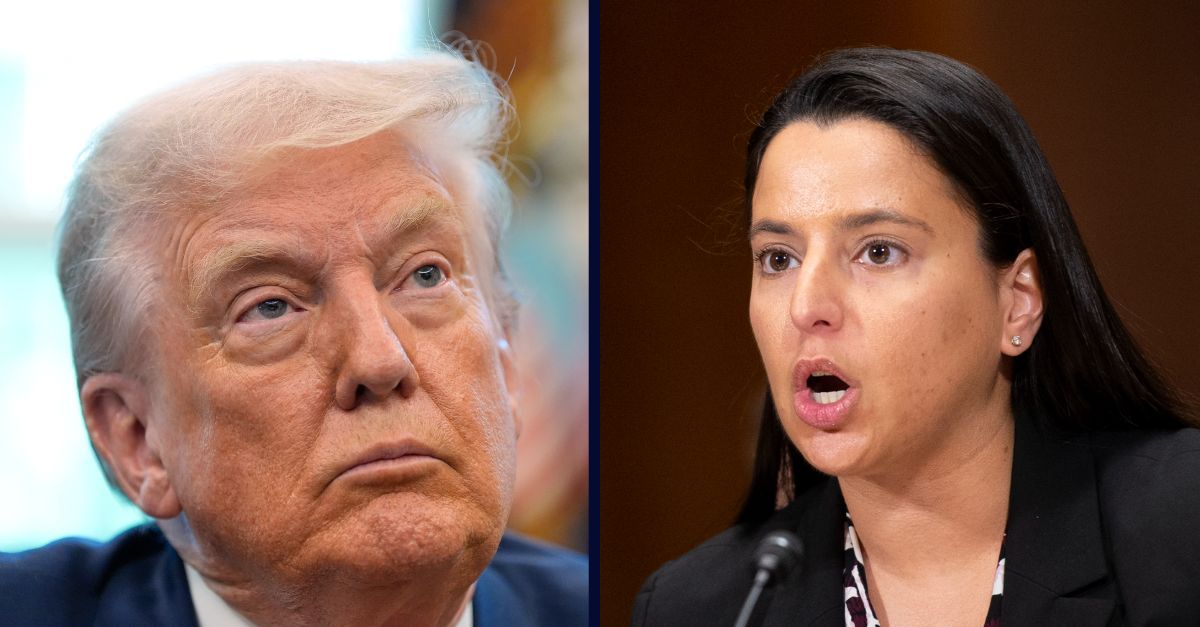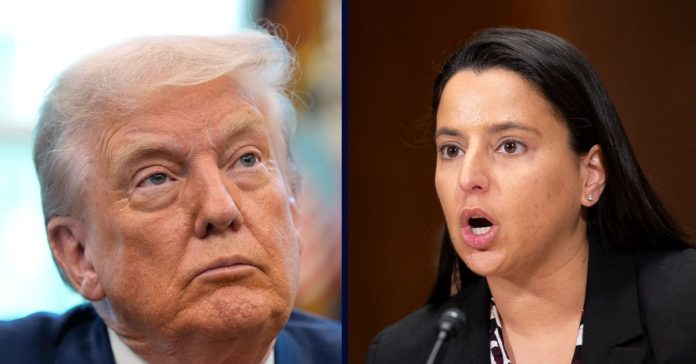
Left: President Donald Trump listens during an event in the Oval Office to mark the 90th anniversary of the Social Security Act, Thursday, Aug. 14, 2025, in Washington (AP Photo/Alex Brandon). Right: Loren AliKhan, Deputy Solicitor General for the District of Columbia, speaks during a Senate Judiciary Committee hearing on “Universal Injunction Challenges’ in Washington on Tuesday, Feb. 25, 2020 (Photo by Caroline Brehman/CQ Roll Call via AP Images).
The president and CEO of a congressionally created independent U.S. agency, subjected to dismantling by the U.S. Department of Government Efficiency (DOGE) and President Donald Trump, was unlawfully sent packing based on a nonexistent “loophole” that “makes no sense,” a federal judge ruled Thursday.
Sara Aviel had for roughly three years headed the Inter-American Foundation (IAF), a grantor which exists by statute to invest in and promote democratic development “across Latin America and the Caribbean.” However, one month after Trump’s second inauguration, POTUS and DOGE took aim at the agency and many others like it.
In February, Trump issued Executive Order 14217 with the express purpose that “unnecessary” federal bureaucracy “be eliminated to the maximum extent consistent with applicable law[.]”
U.S. District Judge Loren AliKhan, Washington, D.C.’s former solicitor general and a Joe Biden appointee whom her critics described as “extreme” prior to her confirmation, has already been a thorn in the Trump administration’s side in this case, other firing cases, and for Trump’s executive orders targeting law firms.
Now AliKhan has issued a declaratory judgment finding that Aviel’s “alleged firing” violated the Appointments Clause of the Constitution and the Federal Vacancies Reform Act. As a result, the “alleged termination was without legal effect and she remains the lawful president of the IAF,” AliKhan said. The man who purported to replace her, Pete Marocco, “was not properly appointed as an acting IAF Board member and lacked any authority to take actions in that role,” the judge ruled.
Love true crime? Sign up for our newsletter, The Law&Crime Docket, to get the latest real-life crime stories delivered right to your inbox
Marocco, known for his role in dismantling the U.S. Agency for International Development, has served in several acting roles at agencies the Trump administration has attempted to wind down. A different federal judge in D.C., in a separate case, ruled in June that Marocco’s separate appointment as the acting chair of the U.S. African Development Foundation was “likely unlawful.”
In this instance, after the attempted ousting of Aviel, Marocco appointed himself as acting president and CEO of IAF through his status as a lone “supposed IAF Board member,” as AliKhan described him, installed by Trump under the following sequence of events:
On February 28, Mr. [Trent] Morse informed the IAF’s Chief Operating Officer that President Trump had exercised his “inherent authority under Article II” to appoint Mr. Marocco as the “acting chairman and board member of the Inter-American Foundation.” Mr. Morse represented that the IAF was, at that time, without a “Board.” That same day, Mr. Marocco “visited the IAF headquarters[] seeking to hold an ’emergency board meeting.'” Unable to gain access to the building, Mr. Marocco held the meeting directly outside the IAF headquarters. While Mr. [Nate] Cavanaugh and Mr. [Ethan] Shaotran were present at this meeting, Mr. Marocco “was the only purported Board member in attendance.” Mr. Marocco closed the meeting to the public and then voted to appoint himself as the IAF’s acting president and CEO.
In a footnote, AliKhan commented that “[w]hether Mr. Marocco was indeed a member of the IAF Board at any point in time is a core issue in this case,” explaining later her view at this stage that he “lacked any authority to take actions in that role.”
While issuing a permanent injunction in Aviel’s favor, the judge made sure to abide by U.S. Supreme Court precedent to “exclude the President of the United States” from the order, but still spelled out her reasoning that Trump himself “lacked the authority to unilaterally terminate” the IAF president and CEO from her job: Aviel is an “inferior officer” who answers to the Senate-confirmed “principal officers” on the Board of Directors, as structured by Congress.
“The IAF’s organic statute makes clear that Congress intentionally gave the Board, not the President of the United States, the power to hire and fire the Foundation’s president,” AliKhan wrote, before taking apart the administration’s arguments to the contrary.
The government maintained that because Aviel was essentially the last person standing of significant rank and executive authority at IAF — in a situation where Marocco’s acting appointment to the board didn’t fly — Trump should be able to oust her directly.
“They now claim that ‘if the President does not have the authority to designate acting Board members, then the President must have the authority to remove [Ms.] Aviel himself’ pursuant to his inherent Article II powers,” AliKhan summarized. “In other words, President Trump’s inability to appoint Mr. Marocco enables him to skip past the IAF’s principal officers to terminate its inferior officer.”
That “has worrisome implications” if true, the judge continued, because it would mean Trump has created or discovered a “basic loophole” to “easily circumvent the general restriction on firing inferior officers by simply firing the principal officers.”
“That makes no sense,” AliKhan remarked, since Trump would be able to “fire an otherwise-unfireable officer by first terminating her superiors.”
In parting shots, the judge called the administration’s arguments “riddled with constitutional contradictions” and took a dim view of the upshot of the administration’s “novel and wrong” assertion that Trump has “‘inherent’ Article II power to appoint acting officials” like Marocco, regardless of congressional intent.
If this view of executive power were to be accepted, the Appointments Clause of the Constitution would be rendered meaningless, AliKhan said.
“On a far more concerning level, Defendants’ argument practically obliterates the Appointments Clause and its requirement that all principal officers receive the Senate’s advice and consent,” the judge concluded, noting that Trump would be empowered to sidestep Congress and keep an acting official of his choosing in place indefinitely without ever bothering with the confirmation process.
Read the whole opinion here.

